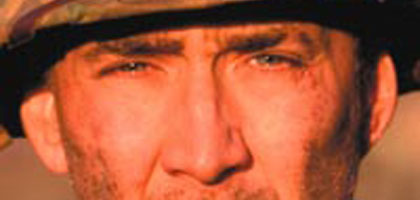
Windtalkers
USA 2002

Reviewed by Andrew O'Hehir
Synopsis
Our synopses give away the plot in full, including surprise twists.
The Solomon Islands, 1943. US marine corporal Joe Enders (Nicolas Cage) takes command of his unit when his superiors are killed. Following orders, Enders refuses to retreat before a Japanese assault and all 15 men under his command are killed. He is injured but survives. At a hospital in Hawaii, Enders, whose inner ear is damaged, struggles to rehabilitate himself for active duty, with the help of Rita, (Frances O'Connor) a nurse. Meanwhile, two Navajo men from Arizona, Ben Yahzee (Adam Beach) and Charlie Whitehorse (Roger Willie), join the marines to become 'code talkers' who can translate the new US military code based on the Navajo language.
Enders and another marine, Pete 'Ox' Anderson (Christian Slater), are promoted to sergeant and assigned to guard Yahzee and Whitehorse. Their responsibility is to "protect the code", meaning they must kill the Navajo men rather than allow them to be captured. The four are thrown into ferocious hand-to-hand fighting in the battle of Saipan. Anderson and Whitehorse become friendly but Enders, still haunted by the men who died in the Solomons, remains distant from Yahzee until the latter saves their lives by impersonating a Japanese soldier and penetrating enemy lines. During a Japanese counterattack, Anderson is killed and Whitehorse briefly captured, but Enders kills him before he can be interrogated. The Navajo code helps turn the tide but Yahzee turns against Enders, angry about his killing of Whitehorse. In the final stages of the battle, Enders rescues the injured Yahzee but is mortally wounded carrying him to safety.
Review
Windtalkers opens with a series of shots of the massive stone formations in Arizona's Monument Valley, and ends up there too. That evocative location, bookending a dizzying, bloody tale of honour and death in the US Marine Corps' Pacific campaign of World War II, stands as a kind of proclamation: John Woo has entered John Ford territory. One could argue this is a natural, even inevitable development in Woo's continuing transition to Hollywood. Ford's influence on Woo's film-making career has always been clear; no two directors are more passionately concerned with the mythography of manhood, with the codes of masculinity that justify violence but also require an almost monastic loyalty and an ethic of self-sacrifice.
The strengths and weaknesses of Windtalkers (and both are considerable) alike stem from Woo's ambitious attempt to merge his own obsessions with Ford's, to bring both his operatic action-cinema style - so widely imitated in recent years - and his peculiar preoccupation with religious faith into Ford's world of cowboys and Indians, with its surface idealism and its undertones of profound racial and national guilt. Shot down in the end by its almost nonsensical plot and the formulaic GI speak of its dialogue, Windtalkers isn't quite the masterwork about American manhood Woo wants it to be. It might be better understood as an ingenious but limited meditation on masculinity in the movies, a memorable work of pure cinema whose resemblance to the real world is coincidental.
Whatever its problems, Windtalkers displays none of the boredom that has seemed to afflict Woo's Hollywood films from Hard Target to Mission: Impossible II. It's full of the semi-mystical imagery, painterly approach to landscape (which then erupts into violence) and unapologetic sentimentality that has marked the director's best work. No other living film-maker could make a cornball scene in which a group of marines play poker while another sits in a darkened corner playing a Navajo wooden flute so genuinely moving and mysterious. (It's a scene Ford would have relished, although I doubt he could have pulled it off as successfully.)
In an age when so much action cinema is visually incoherent, Woo's epic recreation of the June 1944 battle of Saipan (often ignored by war buffs, as it was almost simultaneous with the D-Day invasion) is masterful. He resists the photographic trickery and incomprehensible chaos that made Ridley Scott's Black Hawk Down so exhausting, carefully alternating travelling shots that place the viewer in an almost godlike perspective with harrowing subjective points of view (we are inside the head of Ox, played by Christian Slater, just as he is decapitated and the screen goes black).
Windtalkers is notably both a war film and a Western, and as one of the Navajo characters remarks, any scenario in which the cowboys guard the Indians is fraught with peril. If this were in fact a Ford film, the part of Sergeant Joe Enders, here played by Nicolas Cage (now established as a Woo regular), would of course belong to John Wayne. Scarred by the deaths of 15 men under his command, Enders is a cryptic loner who seems bent on fulfilling his duty or destroying himself, preferably both. He is thoroughly uninterested in women, or at least in Rita, a navy nurse who sends him letters he doesn't read (we hear them in voiceover anyway). Enders' job isn't guarding 'code talker' Ben Yahzee (Adam Beach, who moves impressively from .aw-shucks optimism to bitter rage), it's guarding the Navajo code itself, which means it's his responsibility to kill Yahzee rather than see him captured alive by the Japanese.
Like many of the details in Windtalkers, this premise is apparently a gross exaggeration if not an outright falsehood. (There was indeed a US military code based on the Navajo language that was never broken by the Japanese, but the 'code talkers' themselves were precious commodities generally kept away from the front lines.) But Woo needs this melodramatic improvement on history (as delivered by John Rice and Joe Batteer's screenplay) to concoct what seems to be both a religious fable of sin and redemption and a social fable of racism and reconciliation.
Forced by circumstance to kill Yahzee's friend and fellow code talker, Private Charlie Whitehorse, Enders later begs Yahzee to kill him. Of course Yahzee stays his hand, and of course his mercy is repaid when Enders carries the wounded Yahzee from the battlefield across his shoulders, in what may be the most overtly Christ-like image in any of Woo's films. This is all too much symbolic weight for a movie that already features Navajo grief ceremonies, a shoot-out in a Buddhist temple and a Catholic church drawn on a flour-coated tabletop and then ferociously rubbed out. (Enders, remembering his days as a Catholic schoolboy, says: "They told me I was a soldier of Christ. Somewhere along the way I must have switched sides.") Yet if Windtalkers is overlong and hopelessly overwrought, it is also thrilling and beautiful. It proves that John Woo can still dream of great things, and anyone who appreciates ambition in mainstream cinema can only be grateful
Credits
- Director
- John Woo
- Producers
- John Woo
- Terence Chang
- Tracie Graham
- Alison Rosenzweig
- Screenplay
- John Rice
- Joe Batteer
- Director of Photography
- Jeffrey Kimball
- Editors
- Steven Kemper
- Jeff Gullo
- Tom Rolf
- Production Designer
- Holger Gross
- Music/Music Conductor
- James Horner
